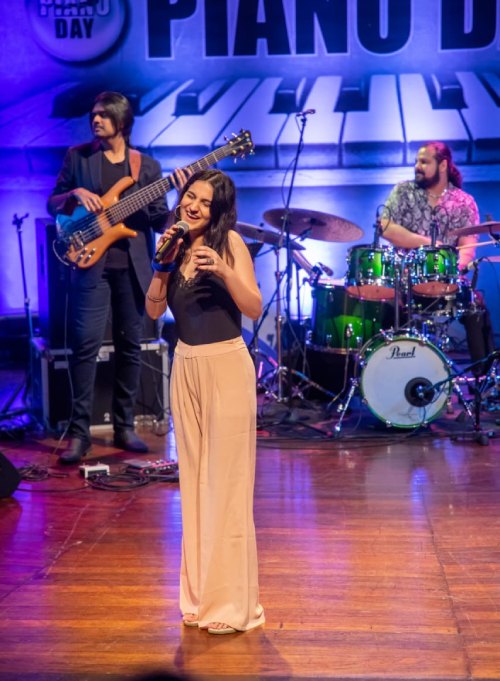I teach a semester titled ‘Introduction To World Percussion’ at the NMIMS School Of Performing Arts in Mumbai. It is a very encouraging sign to see the quality of music education evolve into an international standard course at an institution with the best faculty in the country coupled with a growing infrastructure. As a part of this course, working in tandem with my big brother and drum faculty, Mr. Gino Banks, I introduce all the students (regardless of their instrument specialization) to various percussion instruments, basic rhythmic concepts that they can apply on their respective musical instruments and finally, to the world of djembe (West-African Percussion). It could be something as small as playing a shaker or a clave while singing to support the overall groove; percussion is an integral part of everything. An understanding of a new (Mandingue) culture helps us welcome new indias into our compositions and music making style. Besides, knowledge is power and knowing the depth associated with the djembe will help eradicate the common misconception that it is merely a drum circle instrument. On the contrary, it has a rich tradition and every social phenomenon in life in the Mandingue is accompanied with the djembe. There is an attractive element to this instrument which made its popularity spread like wildfire over the last two decades. Basically, there is a lot any instrumentalist can take back from this module.
The following report is written by Anubha, one of the singers at the college. I thought that her clarity of thought deserved a highlight. If you are looking for drum classes in Mumbai, djembe classes in Pune, you know where to look. Happy reading…
Varun Venkit

Djembefola, February 26, 2020 – our tiny batch of 9 watched “Djembefola”, master Mamady Keita’s documentary portraying his journey as one. As a little kid, the master would beat on anything and everything idiophonic and at just 14, would become one of the five percussionists in Le Ballet National Djoliba. His love and passion for the instrument, the culture that has birthed the instrument and the people that have built the culture have been very beautifully captured.
Of all the things that caught my attention, what especially stood out is that Africans take immense pride in their culture. And an integral part of this culture is their music. The two are wholly symbiotic. Every life event calls for a celebration in the community and every celebration has its own synonymous dance and music. It is the purest form of art – one that comes out of passion.
An act of compassion as lending a helping hand on farmlands of the old or the sick (called Senessounian) is also celebrated with music and dance. Upon his return, Mamady’s sister performs the Moribayassa. No matter what the occasion, we find that the djembe is always present. Many instances in the documentary reiterate that the djembe and the African music are mutually inclusive. It is one of the key elements driving the music.
Their firm beliefs are deeply rooted in the culture. They half contribute to the richness of art. For instance, the master attributes years of his tireless and painless playing to a treatment with the extract of a ‘special plant’ done by his first teacher, Karinkajdan Kondé.
Having returned to Conakry and the musicians he grew up with, even after 6 years, they shared a non-verbal understanding of the way each one played. Mamady mentioned that he never has to worry about his solos when playing with them because of this understanding and the fact that they’re incredibly skilled. Also, because this music and the rhythm runs in their blood.
Playing the djembe is an arduous activity but he never seems to treat it as such. He is as natural and effortless as they come. Every beat translates to an expression. He is testimony to the fact that skill is not the only asset necessary for musicianship. Our experiences, the magnitude of our surrender shape the delivery of that skill.
Anubha Kaul, Singer and student at NMIMS School Of Performing Arts, Mumbai

Varun is the founder and director of Taal Inc.
The visionary behind the motto
Come. Drum. Be One.
To read more about him Click Here
